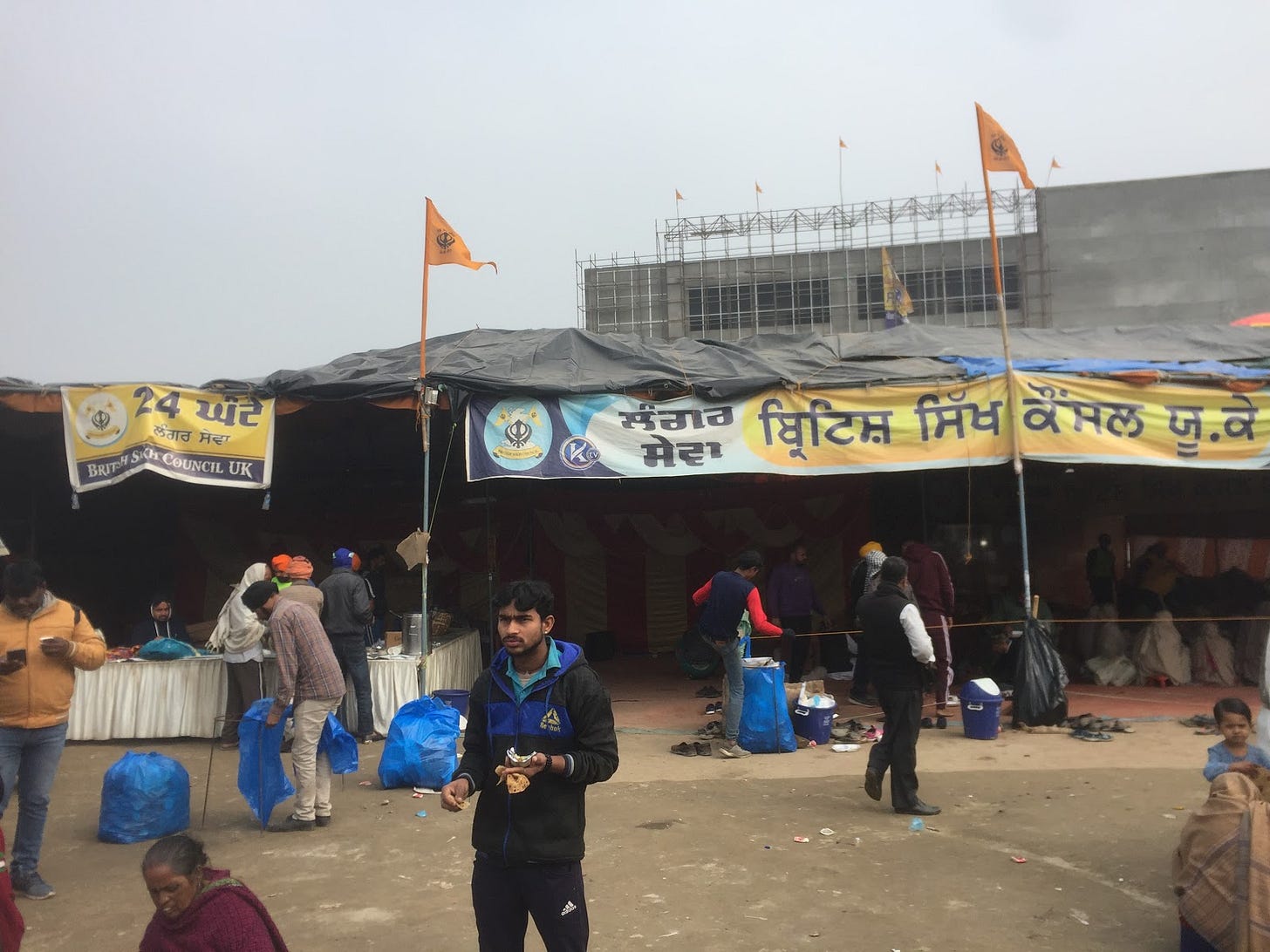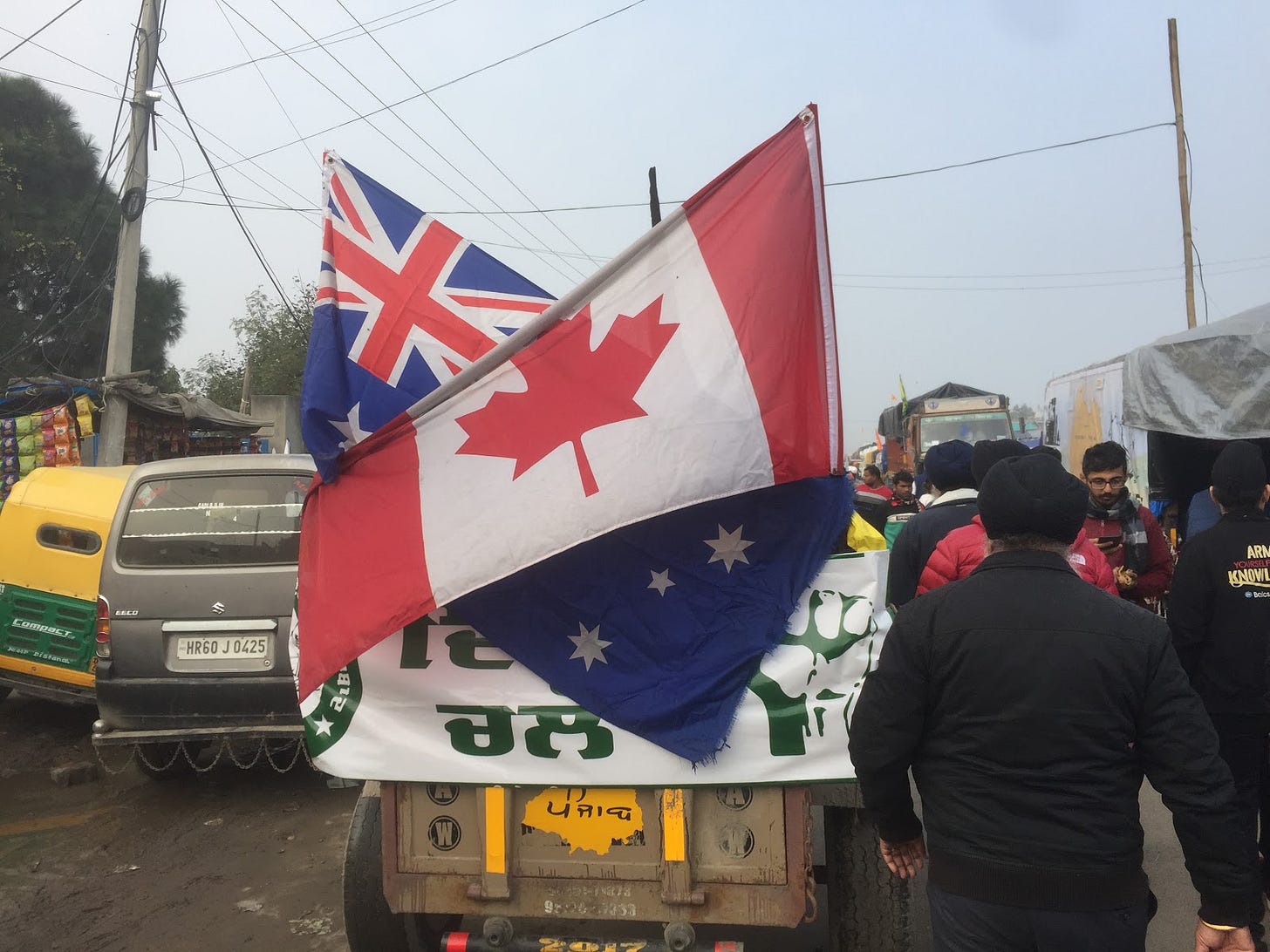Sandeep Singh: Punjab Lives With The Diaspora's Help
“Tusi Vasde Raho Pardesio, Tuhade Nal Vase Punjab”
Sandeep Singh
3.5 min. read
On the morning of January ninth, a protesting farmer-led an ardaas from the Kisan Mazdoor Sangharsh committee’s stage.
The farmer prayed to Waheguru for the chardi kala of supporters in the diaspora. He talked passionately about the contributions of those around the world to Delhi Chalo and the current demonstrations.
For those at the protest site, these sentiments will come as unsurprising - similar words are shared regularly from the United Farmers Front’s stage, the largest and main stage of the farmer’s protest currently blockaded outside Delhi, and on the ground.
Trolleys form the backbone of the protest’s physical infrastructure, protecting farmers as they survive a cold and wet winter on a national highway. These trolleys are also used as a vehicle for spreading important messages.
One trolley sign, which belongs to Lakhvir Singh of Hafizabad, village of Chamkaur Sahib Tehsil in Punjab’s Rupnagar district, reads “Tusi vasde raho pardesio, tuhade nal vase Punjab” - “Long live Punjabis abroad, Punjab lives with your help”.
“The diaspora has contributed a lot,” Lakhvir Singh says, “our struggle became strong with their help. They call us and ask about our needs. My own nephew is in the US. He usually asks me about the kind of things we need. Their protests abroad, outside Indian embassies, have also strengthened our protests. It will create pressure on the Indian government.”
One example of diaspora driven assistance garnering wide local support is the langar feeding protestors.
The British Sikh Council UK has been serving langar since November 28, at the very onset of demonstrations. Only a few langars provide meals 24 hours, seven days a week, and the Sikh Council UK’s langar is one of them. Sarbjeet Singh, a volunteer with the organization, shared that 15,000 to 18,000 people have langar every day at their tent.
After noticing that farmers do not have a place to stay at night, Sikh Council UK has also arranged for the accommodation of 2000 farmers in a nearby building and has included provisions such as mattresses and quilts. Apart from this, bathrooms and medical facilities are also being provided for both men and women.
Harpal Singh, a farmer from the village of Ghadka in Tarantaran District, praises those in the diaspora for their contribution.
“We are receiving full support from our brothers and sisters abroad. Wherever they are living in the world, they have come out in our support. Most say that they are physically abroad but they are with us by their hearts. They solve our problems within minutes. Someone had complained about a shortage of firewood. Then many trucks of firewood were sent by our brothers and sisters.”
He also has strong words for those in the government and media questioning the support from the Punjabi and Sikh diaspora.
“BJP leaders and supporters are asking who is sending money to farmers? Our answer is that our brothers and sisters work really hard in western countries and they share their dasvandh with farmers. They share their own money, earned with blood and sweat, because they think that the livelihood of their families in Punjab is in danger.”
Talking specifically about Khalsa Aid, Harpal Singh adds, ”they have provided us everything from socks to underwear to turban material. They do everything to make sure that our needs are fulfilled.”
Sikh and Punjabis protesting in front of Indian consulates around the world have also not gone unnoticed by farmers sitting outside Delhi.
Vikramjeet Singh, a young farmer from Tarantaran, thanks Sikhs and Punjabis in the diaspora, particularly Punjabi students studying abroad, “they protested not only outside embassies but also in colleges and universities. It helped in making an impact on a global level.”
It is not lost on protestors outside Delhi that parallel demonstrations from London to Toronto to Sacramento have added a level of international scrutiny and pressure the Indian government did not expect. The protection those global protests have provided against further state violence, police abuse, and larger crackdowns is well recognized.
Vikramjeet Singh also makes one more observation, one that you hear often on the ground here.
“Many people used to say that Punjabis in the west have forgotten their roots, the youngsters who are living there don’t care much about Punjab. But the way they have protested against new farm laws shows that even though they are living in foreign countries they are close to their people and culture.”
Sandeep Singh hails from Machhiwara, Punjab. As an independent journalist, he has worked with many prominent Indian news organizations. Sandeep has been following the farmer’s protest in Punjab since its onset and traveled with them to Delhi. He spends most of his time at the Singhu border protest site. You can follow Sandeep on Twitter @Punyaab
Baaz is home to opinions, ideas, and original reporting for the Sikh and Punjabi diaspora. Support us by subscribing. Find us on Twitter, Instagram, Facebook at @BaazNewsOrg. If you would like to submit a written piece for consideration please email us at editor@baaznews.org.





